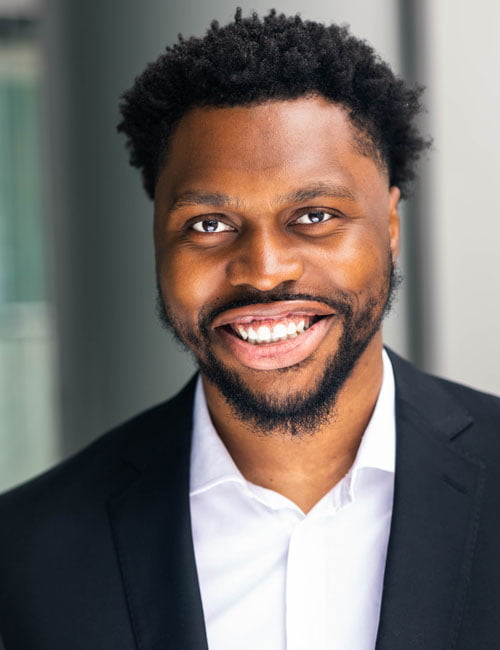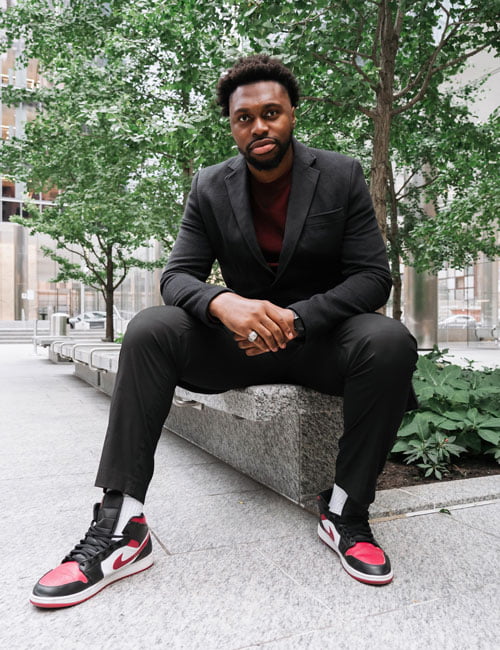Link Kabadyundi ('19 MA; '17 BA, Communication)

Tell us about yourself.
I was born in Kinshasa, Congo, but grew up in Montréal, Canada, during childhood. After studying and living in the U.S. for about 7 years, I returned to Canada and now reside in Toronto.
Why did you choose to attend UTA?
My athletic career drew me to UT Arlington. I started at TCU, spent a year at Blinn Junior College, and from there chose UT Arlington, after meeting the basketball team and visiting the campus. I am grateful that basketball introduced me to everything else that UTA has to offer.
What did you study at UTA? What attracted you to that field?
I am thankful to have graduated from UTA with a BA and MA in Communication. I started my collegiate journey in computer science, but basketball made the pursuance of that path incredibly difficult, hence the redirection towards communication. However, I feel as though it was meant to be; I thoroughly enjoyed the coursework as well as the professors I've had the pleasure of being taught by. Studying communication at UTA has allowed me to expand my mind and open up incredible doors.
Describe your UTA experience. How did UTA help prepare you for your career?
My time at UTA was different from anything I had experienced before; I got to see and better understand the diversity within Texas culture, further develop my critical thinking abilities, and merge my interests for basketball, education, photography, and advocacy. All these elements prepared me for my career. Another very important preparatory element to enter the workforce was learning how to network. At UTA, I refined my ways of networking and this has been the most important thing in my professional journey.
What is your current professional position? What do you do in this role?
Currently, I serve as communications manager at United Way of Canada, where I am responsible for external, executive, and member communications. I also handle media and public relations, special projects, and contribute to the implementation of our national communications strategy. I also serve as director of communications and operations for the SlimmDuck Foundation, founded by NBA player Chris Boucher. I am also the founder of THR1VE Media, where diverse narratives find a home. Through THR1VE, I have seen my content get published on Nike.com and in Atlanta newspapers, and have had the opportunity to work with Fortune 100 executives.
Describe your path to your current position. What have you learned along the way?
My path was not linear at all, especially considering I am Canadian and not American. After I graduated with my Master’s degree, I was looking for conventional employment in the U.S. but the visa requirements made it difficult, which led me to an entrepreneurial path; I did photography and social media management full time for a couple years. I then returned to Canada where I started working in a communication role. I have learned so much from navigating being in two countries and advancing myself with roadblocks. Networking has been key as well as a strong desire for self-actualization. I have used every accomplishment and talent of mine to propel me into the next door of opportunity. This allowed me to learn how to remain humble, but also know my value and present it in a way that enables new opportunities.
"You can play a part in helping others find the extraordinary
within them by simply connecting."

What inspired you to pursue your recent documentary, "Link Kabadyundi: 20-Something"?
In its essence, "20-Something" is a gift-to-self, for my 30th birthday this year. I wanted to reflect on the lessons and successes from the past 10 years, and highlight that although not at peak point, every story matters. My growth, introspective nature, and desire to normalize my lived experience all inspired this project. I am also intentional about highlighting the role of mental health in one’s journey and hopefully inspire others to know that you can achieve anything with the right support.
You can watch the short-documentary at thr1ve.media/20-something.
What's one lesson you learned at UTA that has stayed with you still today?
UTA has taught me so many lessons, but more notable is the power of community and of connection. The relationships I’ve created with my professors, teammates, coaches, athletic staff, and other students have really helped shape my path forward. Every time I travel back to Arlington and set foot on campus, I feel at home and I have been able to replicate this community building skill elsewhere also.
What message do you have for the next generation of UTA graduates?
Network like your life depends on it. The people you may not have an interest in connecting with today are the people you’ll want to collaborate with tomorrow. Everybody brings something valuable to the table and as you hone in on what that means for you, you can play a part in helping others find the extraordinary within them by simply connecting.
Anything else you would like to share?
In 2017, while a student at UTA, I was introduced to an amazing local nonprofit called the Otis & Rosie Brown Foundation, which recognizes ordinary people doing extraordinary things. Its ExtraordinaryIS movement provides scholarships for high school students headed to college and further enables smaller nonprofits in North Texas. I volunteer with this organization to this day and encourage everyone to take a look at the work done in the North Texas community. More information at extraordinaryis.org.
Alumni Spotlight
Mavericks are known for blazing new trails. Read more stories on how UTA alumni are making an impact.